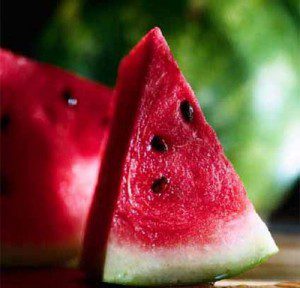By Brian Willett – livestrong.com
Although many people spit out the seeds when eating watermelon, these small kernels can be a rich source of nutrition. Watermelon seeds are not optimal for every diet plan due to the rich fat content, but watermelon seeds do provide nutritional benefits that can make them a valuable addition to your diet plan. You should note that watermelon seeds are calorie dense, so eating them in moderation is best.
CALORIES
Watermelon seeds are not optimal for dieting as they are calorie dense; a 1 oz. serving of seeds contains 158 calories, which comprises 7.9 percent of the daily suggested calorie intake of 2,000. This makes watermelon seeds about as calorie dense as mixed nuts, which provide 174 calories per 1 oz. serving. The calorie density makes watermelon seeds good for active individuals. A 1 oz. serving of watermelon seeds provides enough calories to fuel 43 minutes of weightlifting or 18 minutes of swimming laps.
[pro_ad_display_adzone id=”110028″]
DIETARY FAT
Watermelon seeds can be healthy for you because they are a rich source of dietary fat. Each 1 oz. serving of watermelon seeds provides 13.4 g of dietary fat. Most of this fat is unsaturated, as only 2.7 g comes from saturated fat, which may increase your risk of heart disease. The fat provided by watermelon seeds can be quite beneficial, as fat fuels long exercise sessions and helps your body absorb nutrients.
CARBOHYDRATES
If you are following a low-carbohydrate diet, watermelon seeds can be a good choice. Each 1 oz. serving of the seeds provides just 4.3 g of carbohydrates.
PROTEIN
Watermelon seeds are a rich source of protein, with each 1 oz. serving providing 8 g. Protein is vital for your health because your body needs it to build and repair tissues across your body. Because protein is so important, the Institutes of Medicine suggests consuming at least 0.8 g per kg of your bodyweight of protein each day.
VITAMINS
Watermelon seeds do not provide many vitamins, but low levels of thiamin, niacin and folate, also known as vitamins B-1, B-3 and B-9. These vitamins help your body turn food into usable energy.
MINERALS
Watermelon seeds provide numerous minerals, including calcium, magnesium, potassium and phosphorous. Unlike some seeds and nuts, watermelon seeds are low in sodium, with 28 mg in each 1 oz. serving; this amount is about 1 percent of the daily suggested intake of 2,300 mg.
About the Author
Brian Willett began writing in 2005. He has been published in the “Buffalo News,” the “Daytona Times” and “Natural Muscle Magazine.” Willett also writes for Bloginity.com and Bodybuilding.com. He is an American Council on Exercise-certified personal trainer and earned a Bachelor of Arts in journalism from the University of North Carolina.
Article Sources
livestrong.com
USDA National Nutrient Database: Watermelon Seed Kernels, Dried
Livestrong.com MyPlate: Calories in Mixed Nuts (Planters)
MayoClinic.com; Exercise for Weight Loss: Calories Burned in 1 Hour; December 2009
MedlinePlus Medical Encyclopedia; Dietary Fats Explained; October 2010
Harvard School of Public Health Nutrition Source: Protein: Moving Closer to Center Stage
American Cancer Society; Vitamin B Complex; May 2010
[pro_ad_display_adzone id=”110027″]







